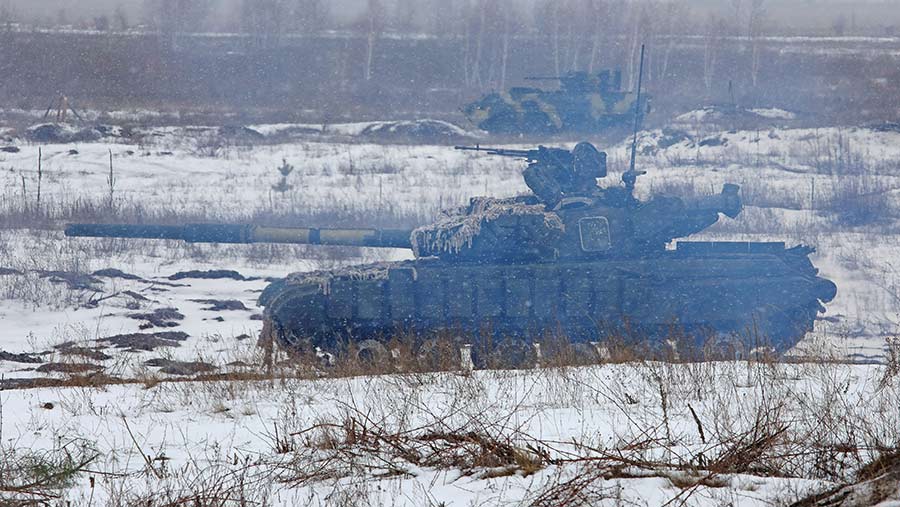EU looks to ramp up grain production as Ukraine war rages
 © Reuters/Vyacheslav Vyacheskyy/Adobe Stock
© Reuters/Vyacheslav Vyacheskyy/Adobe Stock Farmers in Europe could be told to plough up land devoted to environmental schemes and grow more grain as the crisis in Ukraine continues to worsen.
Politicians in Brussels are concerned about the growing impact of the conflict between Russia and Ukraine on food supply and prices.
See also: Ukraine conflict highlights food security
Together, the two countries account for more than 30% of global wheat exports and more than three quarters of the world’s sunflower meal stocks. Ukraine is also the EU’s primary supplier of maize.
With the war continuing, grain prices have soared. May wheat futures closed just shy of £300/t in London on Monday (7 March), and the potential knock-on effect on livestock production costs is huge.
The land being considered for a return to production is currently under the EU Commission’s Farm to Fork and Biodiversity Strategy. The strategy has a target to reserve 10% of agricultural land for high biodiversity landscape features.
Emergency meeting
Speaking ahead of an emergency meeting on the issue in Brussels this week, EU farm commissioner Janusz Wojciechowski said member states would discuss whether the land could be used for protein crop production.
Referring to the 10% area as “set aside”, Mr Wojciechowski said “now might not be the time to do set aside when food security and food sovereignty are endangered”.
France’s agriculture minister, Julien Denormandie, added that a number of member states had requested that set-aside land should be used for growing protein crops.
Practical difficulties
Meanwhile, the Irish government has confirmed it will meet farming organisations today (8 March) to ask farmers to grow more grain.
Irish farm minister Charlie McConalogue said changes would have to be adopted quickly by farmers because the growing season was upon them.
However, while Ireland’s main farming union, the Irish Farmers’ Association, said it would play its part, it also raised practical concerns.
“It is far from certain that asking all farmers to plant crops is the best use of the resources that are likely to be available to us,” union president Tim Cullinan said.
The director of the British Agriculture Bureau in Brussels, Robin Manning, also highlighted practical issues.
He said: “It is easy to say ‘grow more crops’, but this is a practical situation and it is easier said than done.
“Getting enough seed for protein crops, in a short time window, and then planting it in suitable land is difficult. That is why we import them.”
Call for clarification
EU-wide farming union bodies Copa and Cogeca added to the call for clarification.
Copa president Christiane Lambert said farmers and co-operatives were waiting for concrete guidelines and actions as a solution to food, energy, climate and environmental challenges.
Ms Lambert stressed the importance of unity among EU farmers and solidarity with Ukraine.
“Since the Russian government is using food security as a weapon, we must counter it with a food shield,” she said.
Ms Lambert confirmed that in the coming days, Ukraine’s main farming organisation, the Ukrainian National Agrarian Forum, would become a Copa and Cogeca partner.
As Copa and Cogeca had been saying for years, and as the facts clearly proved, food security was highly strategic and still very relevant, she added.
